Rwanda and Uganda Through culture and traditions
Rwanda and Uganda are more than just breathtaking landscapes and wildlife encounters—they are rich in culture, history, and traditions that define the spirit of individual countries Africa. Both countries offer an immersive cultural experience, from the ancient kingdoms and storytelling traditions to vibrant music, dance, and local crafts.
isumbabyose@gmail.com
01:02:31 February 5, 2025
A Deep Connection to Community & Heritage
East African cultures emphasize community, respect for elders, and storytelling as a way to pass down wisdom and history. In Rwanda and Uganda, traditions are deeply rooted in daily life, from the art of cattle-keeping and traditional healing to the importance of dance and drumming in celebrations.
Both countries have preserved their cultural identity while embracing modernization, making them a fascinating destination for travelers looking to experience the true essence of Africa.
Traditional Dance, Music & Storytelling
Music and dance play a central role in Rwandan and Ugandan culture, used in ceremonies, celebrations, and rituals.
Rwanda’s Intore Dance: The Dance of Warriors
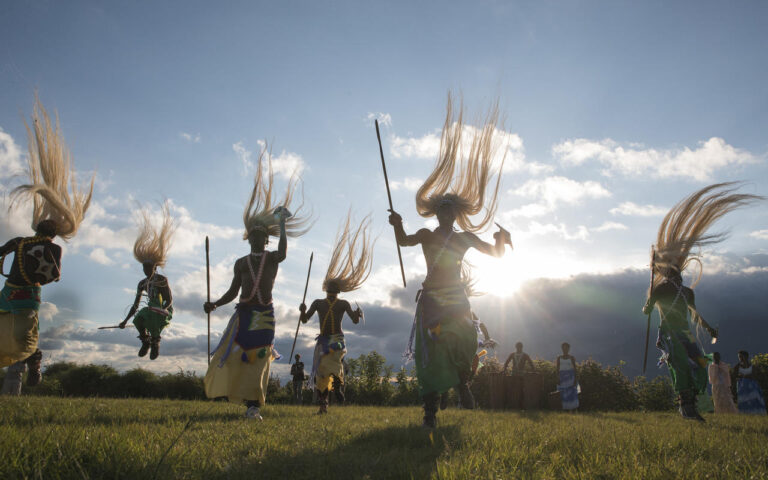
One of the most iconic cultural performances in Rwanda is the Intore Dance, which originated from royal warriors. The dance is characterized by graceful movements, synchronized drumming, and dramatic spear-throwing.
Performers wear colorful attire, beads, and flowing headpieces, symbolizing bravery and unity.
Visitors can experience the Intore dance at Iby’iwacu Cultural Village near Volcanoes National Park, where local communities showcase traditional music, storytelling, and crafts.
Uganda’s Bakisimba Dance & Drumming Culture
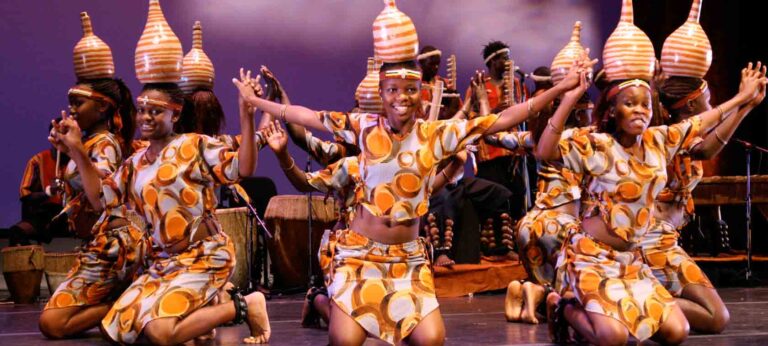
Uganda is home to a diverse range of traditional dances, with each ethnic group having its unique style. The Bakisimba Dance, originating from the Buganda Kingdom, is a joyful, rhythmic dance performed to celebrate prosperity. The movements mimic the act of pounding millet to make local beer, a symbol of community and abundance.
Drumming is another vital aspect of Ugandan culture. The Royal Drums of the Buganda Kingdom, dating back centuries, are considered sacred and symbolic of leadership and power. In Mubako Village near Murchison Falls, visitors can participate in interactive drumming sessions, learning the rhythms that define Uganda’s storytelling traditions.
The Role of Cattle
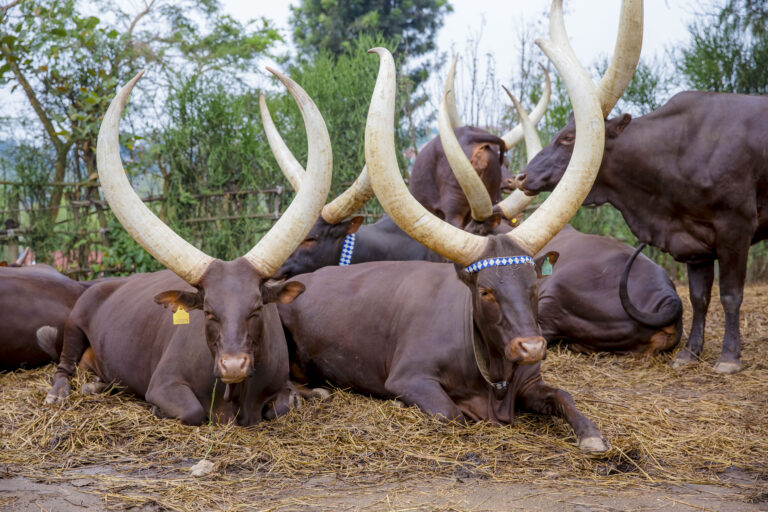
Cattle have played an important role in social status, wealth, and cultural identity. The Ankole cattle, known for their majestic long horns, are especially significant in Ugandan and Rwandan traditions. Historically, these cows were reserved for royalty and used in dowries, ceremonies, and religious rituals.
Visitors can experience traditional cattle-keeping practices at cultural centers like King’s Palace Museum in Rwanda, where the revered Inyambo (royal cows) are kept. These cows were once paraded before kings in elaborate ceremonies, showcasing their importance in Rwandan heritage.
Cultural Heritage & Ancient Kingdoms
Rwanda and Uganda have a rich history of kingdoms and dynasties, each leaving behind fascinating traditions and historical sites.
The Buganda Kingdom – Uganda’s Largest & Most Influential
The Buganda Kingdom is the most powerful and influential in Uganda, with traditions that date back over 700 years. The Kabaka (king) of Buganda still holds an important cultural role today, and visitors can explore the Kasubi Tombs (UNESCO World Heritage Site), where Buganda kings are buried.
Other significant cultural sites include:
• Mparo Tombs – Resting place of the Bunyoro Kingdom’s kings.
• Bigo Bya Mugyenyi – Ancient earthworks believed to be over 1,000 years old.
• Igongo Cultural Center – A place to learn about the Ankole Kingdom and its traditions.
Rwanda’s Kingdoms & Traditional Leadership
Although Rwanda is no longer a monarchy, its history is deeply tied to pre-colonial kingdoms and royal traditions. The King’s Palace Museum in Nyanza offers an insight into the life of past monarchs, featuring a traditional thatched palace, royal artifacts, and the revered Inyambo cattle.
Visitors can also explore:
• Ethnographic Museum in Huye – One of the best places to learn about Rwandan history and cultural heritage.
• Iby’iwacu Cultural Village – An interactive cultural experience where visitors can participate in traditional ceremonies, music, and food preparation.
Traditional Food & Culinary Experiences
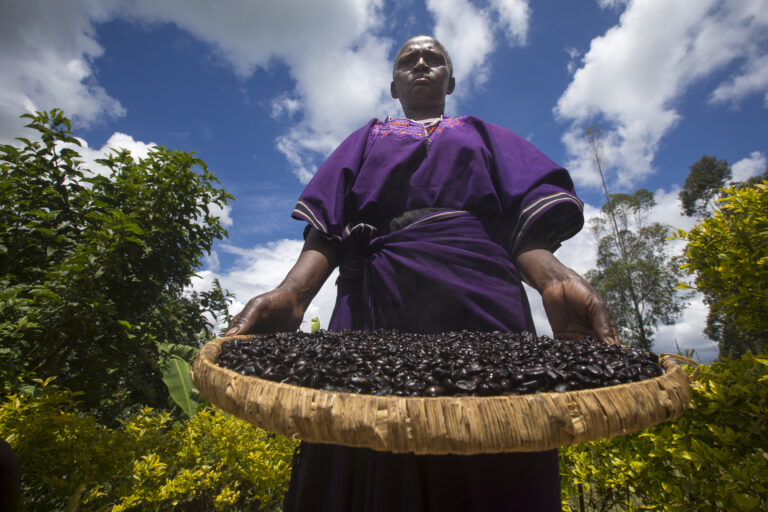
Traditional Food & Culinary Experiences
Rwandan and Ugandan cuisine is simple yet flavorful, based on locally grown ingredients like bananas, beans, maize, and groundnuts. Both countries have unique dishes that reflect their agricultural heritage and communal way of eating.
Rwandan Cuisine
• Ugali (Isombe) – A staple dish made from cassava leaves and served with groundnut sauce.
• Brochettes – Grilled skewers of beef, goat, or fish, a popular street food.
• Ibirayi (Potatoes with Sauce) – A common dish in the Rwandan countryside.
For an authentic fine-dining experience, visit Meza Malonga in Kigali, where renowned chef Dieuveil Malonga fuses Rwandan flavors with modern culinary artistry.
Ugandan Cuisine
• Matoke – Steamed bananas, often served with peanut sauce or meat stew.
• Rolex – A popular street food made of eggs rolled in a chapati.
• Luwombo – A delicious dish where meat or vegetables are slow-cooked in banana leaves.
Travelers can visit local markets and cooking classes in Kampala and Jinja, where they can learn how to prepare traditional Ugandan meals.
Handicrafts & Art: A Legacy of Tradition
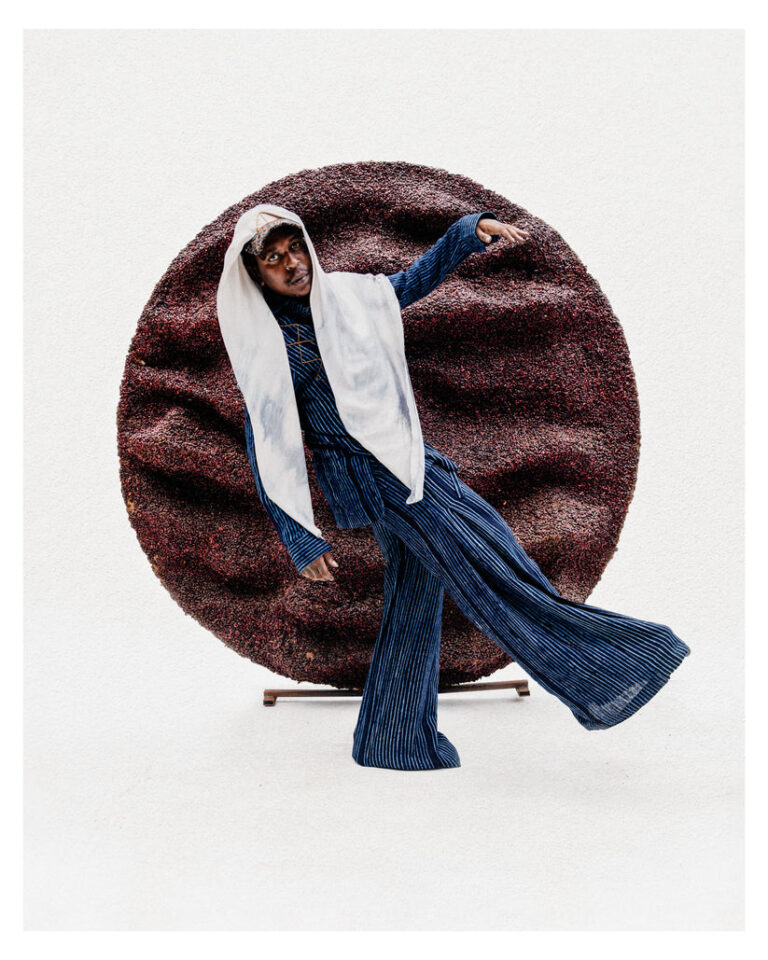
Rwanda and Uganda are known for their beautiful handmade crafts, passed down through generations. Local cooperatives and artisan groups create stunning pieces that reflect cultural identity.
What to Buy in Rwanda
• Imigongo Art – A unique Rwandan art form made from cow dung, featuring geometric patterns.
• Agaseke Baskets – Traditional Rwandan woven baskets, symbolizing unity and peace.
What to Buy in Uganda
• Banana Fiber Art – Intricate Ugandan art made from dried banana leaves.
• Bark Cloth – An ancient Ugandan fabric, historically used by royalty.
Visitors can explore craft markets such as Kimironko Market in Kigali and Buganda Road Craft Market in Kampala, where local artisans sell authentic handmade goods.
Experience Rwanda & Uganda’s Rich Culture Firsthand
Whether it’s witnessing the powerful rhythms of traditional dance, exploring royal palaces, sharing meals with local families, or learning about ancient traditions, Rwanda and Uganda offer an unmatched cultural immersionthat goes beyond wildlife safaris.
Introduction to Rwanda's BeautyRwanda, often referred to as the 'Land...
Discover Rwanda's Unique LandscapesAt Safari Partners Africa, we pride ourselves...
Kigali, Rwanda
Subscribe to get all latest offers from our team
Kigali, Rwanda
Subscribe to get all latest offers from our team
Safari Partners Africa
Copyright © 2025. All rights reserved